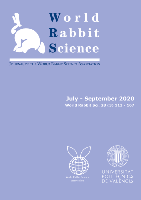
World Rabbit Science
Scope & Guideline
Empowering researchers to revolutionize rabbit science.
Introduction
Aims and Scopes
- Rabbit Production Systems:
Focuses on different husbandry practices, including extensive and intensive systems, and their impacts on productivity, animal welfare, and environmental sustainability. - Nutrition and Feed Efficiency:
Explores dietary formulations, supplementation strategies, and their effects on growth performance, health, and meat quality in rabbits. - Reproductive Management:
Investigates reproductive physiology, artificial insemination techniques, and genetic factors influencing reproductive traits in rabbits. - Health and Disease Management:
Examines common health issues, disease prevalence, and management practices to enhance rabbit health and welfare. - Consumer Preferences and Market Trends:
Analyzes consumer perceptions and market dynamics surrounding rabbit meat consumption and the implications for rabbit farming. - Genetic Studies and Breeding:
Focuses on genetic diversity, breeding strategies, and the identification of traits that improve growth rates, feed efficiency, and disease resistance.
Trending and Emerging
- Sustainable Rabbit Farming:
An increasing number of studies focus on sustainable practices, including organic certification and urban farming, reflecting global trends towards more environmentally friendly agricultural practices. - Nutritional Innovations:
Research into alternative feed sources, such as seaweed and pistachio skins, is on the rise, driven by the need to enhance rabbit diets while minimizing antibiotic use. - Animal Welfare and Consumer Awareness:
There is a growing emphasis on animal welfare in rabbit production, alongside consumer awareness regarding ethical meat sourcing, which is influencing farming practices. - Genomic Studies and Genetic Improvement:
The journal is seeing a rise in genomic and genetic studies aimed at improving growth, feed efficiency, and disease resistance traits in rabbits. - Health Management and Disease Prevention:
Increasing attention is being paid to proactive health management strategies and the identification of risk factors for common diseases in rabbit populations.
Declining or Waning
- Traditional Rabbit Farming Practices:
Research focused on conventional rabbit farming methods is decreasing, possibly as new, more efficient and sustainable practices gain traction. - Historical Studies on Rabbit Breeding:
There is a noticeable reduction in studies dedicated to historical breeding practices, as contemporary genetic and reproductive research takes precedence. - Pathological Studies on Rare Diseases:
While health is still a significant topic, studies on rare diseases affecting rabbits are becoming less frequent, potentially due to a shift towards more common health issues and management practices.
Similar Journals
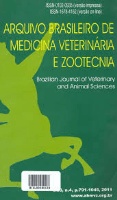
ARQUIVO BRASILEIRO DE MEDICINA VETERINARIA E ZOOTECNIA
Championing excellence in veterinary research and education.ARQUIVO BRASILEIRO DE MEDICINA VETERINARIA E ZOOTECNIA, an esteemed publication in the field of veterinary medicine and animal science, has been a vital resource for researchers and professionals since its inception in 1996. Published by the ARQUIVO BRASILEIRO MEDICINA VETERINARIA ZOOTECNIA, this journal is recognized for its open-access model, allowing widespread dissemination of knowledge since 1999. With a 2023 Scopus ranking placing it in the 25th percentile within the veterinary field, ARQUIVO BRASILEIRO is categorized in Q3 in Veterinary (miscellaneous), highlighting its commitment to scholarly excellence. The journal's scope encompasses a diverse range of topics related to veterinary medicine and zootechnics, making it a crucial platform for advancing research and professional practice. Situated in Belo Horizonte, Minas Gerais, Brazil, it serves not only the local community but also an international audience, fostering collaboration and innovation in veterinary sciences. As such, ARQUIVO BRASILEIRO is an invaluable asset for students, researchers, and practitioners looking to stay at the forefront of veterinary research.

Applied Animal Science
Fostering Insights for a Sustainable Future in Animal SystemsApplied Animal Science, published by Elsevier Science Inc, is an esteemed journal that has quickly made its mark in the fields of Animal Science and Food Science since its inception in 2019. With an ISSN of 2590-2873 and an E-ISSN of 2590-2865, this journal has received commendable recognition, achieving a Q2 ranking in both categories as of 2023. Encompassing a broad scope that integrates cutting-edge research and practical applications, Applied Animal Science seeks to disseminate knowledge that advances the well-being of animal systems and food safety. Researchers and professionals in the agricultural and biological sciences benefit from its high-quality articles, which are ranked #152 out of 490 and #200 out of 389 in their respective fields according to Scopus rankings. While currently not open access, the journal remains accessible to a global audience of scholars eager to explore innovative findings and robust methodologies. As it continues to grow through 2024 and beyond, Applied Animal Science aims to be a pivotal platform for fostering knowledge exchange and inspiring future studies in its domain.
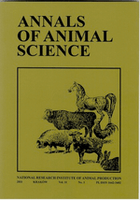
Annals of Animal Science
Championing Quality Research in Animal WelfareAnnals of Animal Science is a prestigious academic journal, published by Walter de Gruyter GmbH in Germany, specializing in the multifaceted field of Animal Science. With an ISSN of 1642-3402 and an E-ISSN of 2300-8733, this journal is recognized for its high-impact contributions, holding a commendable impact factor that demonstrates its relevance in nurturing quality research. The journal has garnered Q2 rankings in 2023 across various categories including Animal Science and Zoology, Food Animals, and Small Animals. Notably, its Scopus Rankings indicate an elite standing, with the journal placing in the top 10% within its specific fields. Covering converged years from 2008 to 2024, the Annals of Animal Science serves as an essential platform for researchers, professionals, and students to disseminate knowledge and advance studies related to animal health, welfare, and production. The journal also emphasizes open access, promoting broader accessibility to foster collaboration and innovation in Animal Science globally. For those committed to advancing their understanding of veterinary and agricultural sciences, this journal is a vital resource.

European Poultry Science
Exploring breakthroughs in poultry health and production.European Poultry Science is a distinguished journal published by EUGEN ULMER GMBH CO, dedicated to advancing the field of poultry research and animal science. With an ISSN of 1612-9199, this journal provides an open-access platform for researchers and professionals to disseminate their findings on topics relevant to food animals, particularly poultry. Operating from Germany, the journal has established its significance in the scientific community, evidenced by its Q3 ranking in both the Animal Science and Zoology and Food Animals categories as of 2023. The journal's Scopus rankings further reflect its competitive standing within Veterinary Food Animals and Agricultural and Biological Sciences. As we anticipate the convergence of research from 2014 to 2024, European Poultry Science remains a vital resource for fostering innovation, sharing knowledge, and supporting the development of best practices within the poultry industry, making it an invaluable asset for academics, industry professionals, and students alike.

Brazilian Journal of Poultry Science
Fostering collaboration for a thriving poultry industry.Brazilian Journal of Poultry Science, an esteemed publication of FACTA-FUNDACIO ARNCO CIENCIA TECNOLOGIA AVICOLAS, serves as a pivotal resource for researchers and professionals in the field of poultry science. Since its inception in 2000, the journal has maintained a commitment to Open Access, ensuring that high-quality research is accessible to a global audience. Based in Brazil, the journal provides a platform for innovative studies and advancements in animal science and zoology, achieving a commendable Q3 category ranking in 2023 and occupying the 270th position in Agricultural and Biological Sciences according to Scopus metrics. With a focus on disseminating robust scientific findings, the journal enhances understanding of poultry production, welfare, and genetics, crucial for the increasingly essential food production sector. Published continuously from 2002 to 2024, it remains dedicated to fostering knowledge exchange, supporting academic growth, and addressing the challenges faced by the poultry industry.
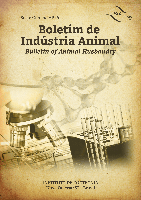
BOLETIM DE INDUSTRIA ANIMAL
Connecting Scholars for a Sustainable Animal FutureBOLETIM DE INDUSTRIA ANIMAL is a prominent academic journal dedicated to the field of animal industry, published by the Instituto de Zootecnia. As an Open Access journal since 1974, it provides a vital platform for researchers, professionals, and students to disseminate knowledge and advancements in animal production, husbandry, and veterinary sciences. With its commitment to enhancing the visibility and accessibility of research, BOLETIM DE INDUSTRIA ANIMAL encourages rigorous scientific inquiry and innovation within its community. The journal presents a rich repository of articles encompassing a wide range of topics related to animal science and industry practices. Published in Brazil and accessible globally, it aims to foster collaboration and knowledge exchange among scholars, ultimately contributing to the advancement of sustainable practices in the agricultural and animal husbandry sectors.

Poultry Science Journal
Bridging the gap between research and practical application in poultry science.Poultry Science Journal, with the ISSN 2345-6604 and E-ISSN 2345-6566, is an esteemed publication spearheaded by Gorgan University of Agricultural Sciences & Natural Resources since its transition to Open Access in 2013. Based in Iran, this journal serves as a vital platform for disseminating cutting-edge research and innovative advancements in the fields of Animal Science and Food Animals. With a current impact reflected in its Q3 quartile ranking within its categories and Scopus ranks indicating a competitive standing among peers, the journal plays a crucial role in enhancing the academic discourse surrounding poultry science. Researchers, professionals, and students alike are encouraged to engage with the journal’s high-quality content, which encompasses diverse topics including poultry genetics, nutrition, health, and welfare, thereby contributing to the improvement of poultry production practices globally. The journal’s commitment to accessibility ensures that valuable findings are readily available to the scientific community, fostering collaboration and advancing research in this essential domain of agricultural science.
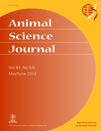
ANIMAL SCIENCE JOURNAL
Elevating Knowledge in Food Science and Animal WelfareAnimal Science Journal, published by Wiley, stands as a premier platform for advancing knowledge in the fields of Agricultural and Biological Sciences, Animal Science and Zoology, and Food Science. With an ISSN of 1344-3941 and an E-ISSN of 1740-0929, this journal not only enjoys a commendable Q2 ranking across multiple categories, reflecting its significance and impact within the academic community, but it also ranks within the top percentiles in terms of Scopus rankings. Operating out of the United Kingdom, the journal covers a broad spectrum of research topics relevant to animal science, encompassing both theoretical insights and practical applications. While it is not an open access journal, it remains an essential resource for researchers and practitioners eager to enhance their understanding of animal sciences, contribute to ongoing debates, and stay abreast of the latest findings from 2003 through 2024. Scholar engagement and innovative research are central to the journal’s objectives, making it an invaluable asset for students, professionals, and academics alike.
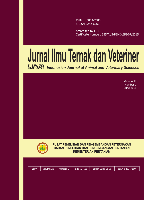
Jurnal Ilmu Ternak dan Veteriner
Exploring groundbreaking solutions in animal husbandry.Jurnal Ilmu Ternak dan Veteriner, published by Pusat Penelitian dan Pengembangan Peternakan, is a leading Open Access journal based in Indonesia that has been providing a platform for groundbreaking research in the fields of animal science and veterinary medicine since its establishment. With its ISSN (0853-7380) and E-ISSN (2252-696X), this journal aims to disseminate high-quality research that addresses critical challenges and innovations in animal husbandry, veterinary practices, and related biological sciences. Recognized within the Q4 category in Animal Science and Zoology and the Q3 category in Veterinary (miscellaneous) as of 2023, it serves as an essential resource for researchers and practitioners looking to stay current with the advancements in these vital fields. The journal's commitment to providing Open Access content since 2011 ensures that cutting-edge findings are readily available to a global audience, fostering collaboration and progress in the animal sciences. With the Scopus ranking reflecting its niche position in the veterinary and agricultural sciences, Jurnal Ilmu Ternak dan Veteriner is poised to make a significant impact through 2024 and beyond.

Tropical Animal Science Journal
Connecting Science and Practice in Animal WelfareTropical Animal Science Journal, ISSN 2615-787X, E-ISSN 2615-790X, is an esteemed open-access journal published by the Bogor Agricultural University, Faculty of Animal Science. Launched in 2018, this journal serves as a pivotal platform for disseminating high-quality research in the fields of Animal Science, Food Animals, and Veterinary Medicine. With its significant presence in Indonesia and a commitment to scientific innovation, it has achieved a Q3 ranking in Animal Science and Zoology and Food Animals, as well as a Q2 ranking in Veterinary (miscellaneous) as of 2023. The journal also enjoys favorable Scopus rankings, placing it in the 61st percentile for General Veterinary and demonstrating its relevance and impact in the academic community. As an advocate for open-access publishing since its inception, the journal enhances accessibility to critical research findings, making it an invaluable resource for researchers, professionals, and students alike who aim to advance their knowledge and contribute to the fields of tropical animal science.